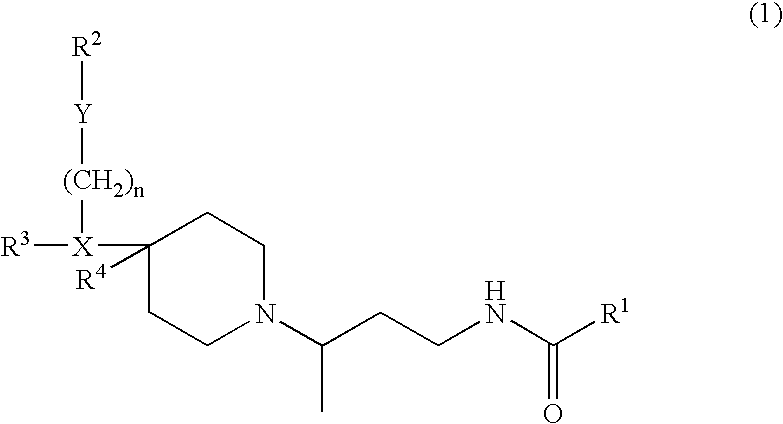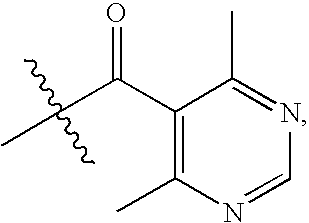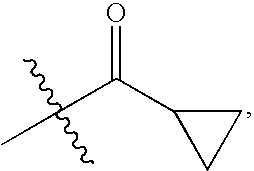Chemokine receptor binding compounds
a technology of chemokine receptors and binding compounds, applied in the field of new compounds and pharmaceutical compositions, can solve the problems of hematopoiesis, hematopoiesis and cardiogenesis, lethal deficiencies in vascular development, etc., and achieve the effects of inhibiting the binding of chemokines, increasing the level of cd4+ cells, and preventing inflammatory and autoimmune diseases
- Summary
- Abstract
- Description
- Claims
- Application Information
AI Technical Summary
Benefits of technology
Problems solved by technology
Method used
Image
Examples
example 1
[0514]
COMPOUND 1: N-(3-{4-[(4-Bromophenyl)-phenoxymethyl]-piperidin-1-yl}-butyl)-2,4-dimethyl-1-oxynicotinamide
[0515] To a solution of 4-[(4-bromophenyl)-hydroxymethyl]-piperidine-1-carboxylic acid tert-butyl ester (370 mg, 1.00 mmol), phenol (141 mg, 1.50 mmol) and Ph3P (393 mg, 1.50 mmol) in THF (6 mL) at room temperature was added DIAD (0.295 mL, 1.50 mmol) dropwise. The mixture was stirred at room temperature for 2.5 hours. Aqueous work-up and purification gave 4-[(4-bromophenyl)-phenoxymethyl]-piperidine-1-carboxylic acid tert-butyl ester as a colorless oil (213 mg, 48%).
[0516] Using general procedure C with the above compound (213 mg, 0.48 mmol), then general procedure B with the resulting amine, 2-(3-oxo-butyl)-isoindole-1,3-dione (156 mg, 0.72 mmol) and CH(OMe)3 (0.15 mL) and then using general procedure D gave 3-{4-[(4-bromophenyl)-phenoxymethyl]-piperidin-1-yl}-butylamine as a colorless oil (79 mg, 40% over 3 steps).
[0517] Using general procedure E, the above primary am...
example 2
[0518]
COMPOUND 2: N-(3-{4-[(4-Bromophenyl)-phenoxymethyl]-piperidin-1-yl}-butyl)-3,5-dichloro-isonicotinamide
[0519] To a solution of (−)-DIP-chloride™ (6.42 g, 20.0 mmol) in THF (10 mL) at 0° C. was added 4-(4-bromobenzoyl)-piperidine-1-carboxylic acid tert-butyl ester (3.68 g, 10.0 mmol). The mixture was stirred at room temperature for 29 hours. Aqueous work-up and purification gave (S)-4-[(4-bromophenyl)-hydroxymethyl]-piperidine-1-carboxylic acid tert-butyl ester (ee 78% determined by both chiral HPLC and Mosher ester) as a crystalline solid (2.22 g, 54%). This material was recrystallized (CH2Cl2 / hexane) three times to provide (S)-4-[(4-bromophenyl)-hydroxymethyl]-piperidine-1-carboxylic acid tert-butyl ester as a white solid (1.29 g, 35%) with ee of 96%.
[0520] To a solution of the above alcohol (370 mg, 1.00 mmol), phenol (141 mg, 1.50 mmol) and Ph3P (393 mg, 1.50 mmol) in THF (6 mL) at room temperature was added DIAD (0.295 mL, 1.50 mmol) dropwise. The mixture was stirred at ...
example 3
[0523]
COMPOUND 3: N-(3-{4-[(4-Bromo-phenyl)-o-tolyloxy-methyl]-piperidin-1-yl}-butyl)-3,5-dichloro-isonicotinamide
[0524] To a solution of 4-[(4-bromo-phenyl)-hydroxy-methyl]-piperidine-1-carboxylic acid tert-butyl ester (740 mg, 2.00 mmol), m-cresol (0.31 mL, 3.00 mmol), Ph3P (786 mg, 3.00 mmol) and THF (13 mL) cooled to 0° C. was added DIAD (0.59 mL, 3.00 mmol) dropwise. The reaction mixture was stirred at room temperature overnight to give a colourless syrup after aqueous work-up and purification.
[0525] Using general procedure C with the above substrate, then general procedure B with the resulting amine and 2-(3-oxo-butyl)-isoindole-1,3-dione (203 mg, 1.00 mmol) and then using general procedure D afforded 3-{4-[(4-bromo-phenyl)-o-tolyloxy-methyl]-piperidin-1-yl}-butylamine as a colourless syrup (81 mg, 10% over 4 steps).
[0526] Using general procedure F, 3,5-dichloroisonicotinic acid (45 mg, 0.24 mmol) and the above amine (51 mg, 0.12 mmol) afforded COMPOUND 3 as a white solid (...
PUM
| Property | Measurement | Unit |
|---|---|---|
| Composition | aaaaa | aaaaa |
Abstract
Description
Claims
Application Information
 Login to View More
Login to View More - R&D
- Intellectual Property
- Life Sciences
- Materials
- Tech Scout
- Unparalleled Data Quality
- Higher Quality Content
- 60% Fewer Hallucinations
Browse by: Latest US Patents, China's latest patents, Technical Efficacy Thesaurus, Application Domain, Technology Topic, Popular Technical Reports.
© 2025 PatSnap. All rights reserved.Legal|Privacy policy|Modern Slavery Act Transparency Statement|Sitemap|About US| Contact US: help@patsnap.com



